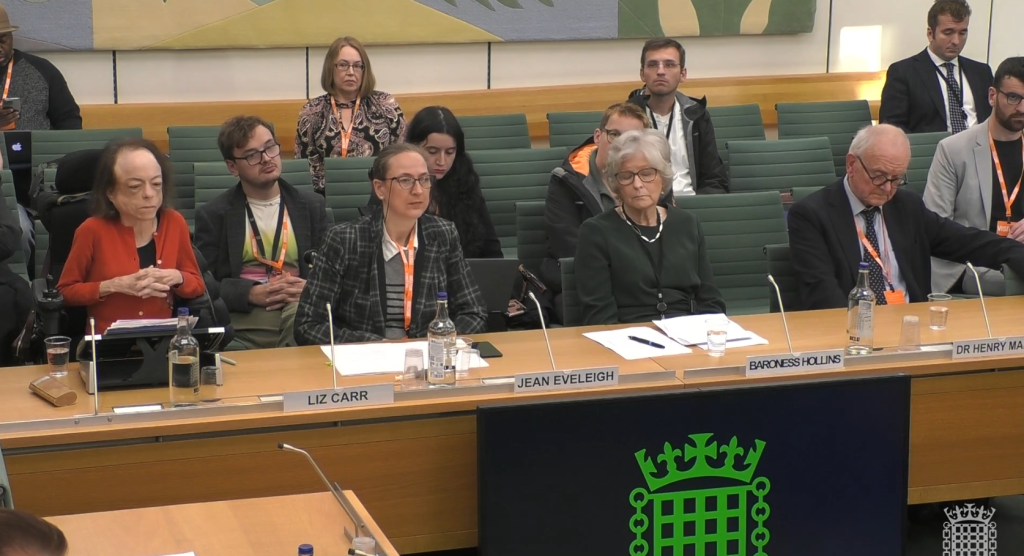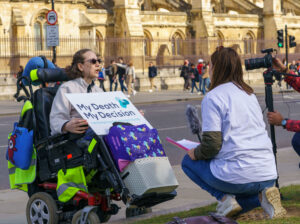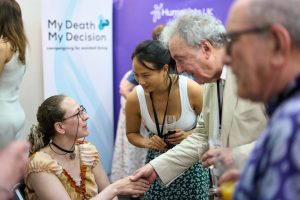 My Death, My Decision patron Jean Eveleigh has given evidence to the Human Rights (Joint) Committee, which held a one-off evidence session on the Terminally Ill Adults (End of Life) Bill, specifically looking at the potential impact on the Human Rights of disabled people. She clashed with anti-assisted dying disability campaigner Liz Carr, over disabled people’s contributions to the Bill. My Death, My Decision is proud to support Jean Eveleigh.
My Death, My Decision patron Jean Eveleigh has given evidence to the Human Rights (Joint) Committee, which held a one-off evidence session on the Terminally Ill Adults (End of Life) Bill, specifically looking at the potential impact on the Human Rights of disabled people. She clashed with anti-assisted dying disability campaigner Liz Carr, over disabled people’s contributions to the Bill. My Death, My Decision is proud to support Jean Eveleigh.
Liz Carr, an actress and disability campaigner who is against the Bill, told the Committee:
‘This session is testimony to the disability voice in the progress of the Bill so far. To the point that we feel that disabled people have a unique perspective, experiences cross over with terminal illness and are one and the same. The absence of our presence or involvement has led to disability rights organisations making a formal complaint to the UN Convention on the Rights of Persons with Disabilities.’
 Jean Eveleigh, Patron of My Death, My Decision, replied that:
Jean Eveleigh, Patron of My Death, My Decision, replied that:
‘There are a cohort of people who, no matter how great palliative care is, no matter how loving their family is and no matter how much medication they are given, just cannot have what they would decide is a good death. They should be given the choice to decide how they want to die. It should not be a decision that is forced upon them by anybody else.
‘If I may come back to Ms Carr and the point about disabled people not being involved in the process, through written and oral testimonies, this is the seventh time I have given evidence on this Bill. At every stage, there have been other disabled people giving evidence as well as myself, so to say that disabled people have not been involved in this Bill is inaccurate.’
Disability Rights UK gave written evidence to the Commons Bill Committee, Baroness Grey-Thompson DBE; Professor Tom Shakespeare CBE FBA, Professor of Disability Research at the London School of Hygiene and Tropical Medicine; Alasdair Henderson, Commissioner at the Equality and Human Rights Commission; and Ken Ross OBE, Founding Officer at the National Down Syndrome Policy Group, all gave evidence to the House of Lords Select Committee.
Furthermore, Marie Tidball, MP and disability rights campaigner, sat on 90 hours of the Commons Bill committee, scrutinising hundreds of amendments. Tidball proposed an amendment to the Bill that requires the Assisted Dying Commissioner to set up a disability advisory board to advise on the implementation and impact of the Bill on disabled people, which was accepted by the Committee and is now part of the Bill.
Dr Henry Marsh CBE, a leading neurosurgeon who co-founded a charity to support palliative care in Ukraine, told the Committee:
‘There is quite a lot of academic literature and peer-reviewed journals looking at the question of whether there is evidence that disabled, vulnerable people are overrepresented in the population of people requesting an assisted death. There is a large number of papers, but nobody has found any evidence that that is the case. In fact, in one study, I think in the Journal of the American Medical Association, in Oregon and the Netherlands, which have had assisted dying in different forms for decades, people who would be considered disabled and vulnerable were underrepresented in the cohort of people wanting an assisted death. The only consistent predictor in most of these studies of people requesting an assisted death is higher education.
‘Again, it is important when you have the discussion on capacity. If one is starting to quote evidence from the Netherlands, we are talking about people who are going to die in six months’ time anyway. They are not choosing death over life. They are choosing how they are going to die.’
Disabled people support assisted dying
There are now multiple independent research studies that make up a growing body of evidence consistently telling the same story:
- A Nuffield Council on Bioethics survey (Sept 2024) reported that 75% of disabled people support a law change in England, compared to 70% from the total sample, a level that remained stable across 2024 despite increased media coverage.
- Whitestone Insight polling commissioned by Care Not Killing (June 2025), found 73% of disabled people support law change, compared to 69% of the overall sample.
- Opinium polling commissioned by Dignity in Dying (Feb 2024) put disabled support even higher, at 78%.
Taken together, these independent surveys show a clear and consistent pattern: disabled people back assisted dying reform with safeguards, at a slightly higher rate than the general population. This is presumably why the vast majority of disability and medical charities have a neutral position on assisted dying.
Human Rights Considerations
On the same day, the Committee examined whether assisted dying legislation would breach the European Convention on Human Rights (ECHR).
Prof Liz Wicks, Professor of Human Rights Law at the University of Leicester, told the Committee:
‘It is important not to be too paternalistic. The Bill is trying to provide an extra choice at the end of life. It is not compulsory; it is not an expectation; it is not to be used as a weapon.
‘In terms of other jurisdictions, there are certainly jurisdictions that have gone much further than this Bill would go with much weaker safeguards and provisions. A key part of this Bill is the terminal illness eligibility requirement. There are other jurisdictions, such as Belgium and the Netherlands, that focus more upon unbearable suffering as an idea. I can see there is potentially a closer link between that and concepts of disability.’
Paul Bowen KC, Barrister at Brick Court Chambers, agreed, outlining how the European Court of Human Rights (ECtHR) delivered a judgment in 2022 on assisted dying in Belgium, Mortier v. Belgium (78017/17), which ruled that Belgium’s law does not violate the Convention (However, it did find that post-death oversight and investigation in that individual case were inadequate). He told the Committee:
‘The safeguards in this Bill are significantly greater than they are under the Belgian scheme. As I have explained, in the case of Mortier the Strasbourg court has already given that scheme a clean bill of health.
‘This idea of the margin of appreciation is the area within which both the Strasbourg court and also the domestic courts will not interfere. If the safeguards are at least as good as those in Belgium, you can be confident that the Strasbourg court is not going to intervene.’
What happens next:
The Bill is now at Committee Stage in the House of Lords for detailed line-by-line scrutiny. My Death, My Decision has raised concerns about the number of amendments introduced by opponents to the Bill.
The Bill will need to complete its passage through parliament by Spring 2026.
 Graham Winyard, Board Member of My Death, My Decision, said:
Graham Winyard, Board Member of My Death, My Decision, said:
‘This week’s evidence session confirmed what we have long known: disabled people are not only engaged in the assisted dying debate, they are leading it. The idea that they have been excluded from the process is simply inaccurate and undermines the contributions of campaigners like Jean Eveleigh, Marie Tidball, and numerous others who have provided testimony, drafted amendments, and scrutinised the Bill in detail.
‘We cannot allow a single narrative to dominate the disability perspective on assisted dying. Multiple surveys now show that disabled people support a change in the law at even higher levels than the general public. That support deserves to be recognised, not dismissed. Respecting disabled people means listening to the full range of views, especially from those who are seeking greater autonomy and compassion at the end of life.’
Notes
Members of the MDMD team, as well as individuals affected by the current law on assisted dying, are available for interview upon request
For further comment or information, media should contact Nathan Stilwell at nathan.stilwell@mydeath-mydecision.org.uk or phone 07456200033. (media only)
Media can use the following press images and videos, as long as they are attributed to “My Death, My Decision”.
My Death, My Decision is a grassroots campaign group that wants the law in England and Wales to allow mentally competent adults who are terminally ill or intolerably suffering from an incurable condition the option of a legal, safe, and compassionate assisted death. With the support of over 3,000 members and supporters, we advocate for an evidence-based law that would balance individual choice alongside robust safeguards and finally give the people of England and Wales choice at the end of their lives.

